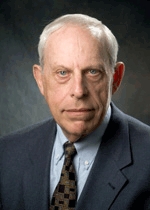Albert Oberman
Year: March 7th, 2003
Location: Miami Beach, Florida
Interviewed by: Blackburn, Henry
Abstract
Al Oberman discusses his long career in CVD epidemiology. He recalls his first experiences with the field in the 1963 follow-up to the Thousand Aviators Study in Pensacola, and the fact that it was never fully exploited and followed. He recounts his formative years and his subsequent training at Michigan with Frederick Epstein, his early inspiration from the AHA epidemiological meetings in Chicago, and his apprenticeship on the AHA Pooling Project.
Oberman later moved to the University of Alabama in Birmingham and there was involved with and led many studies and clinical trials, including MRFIT, HDFP and a number of other hypertension trials, the National Exercise and Heart Disease Project, CASS, the Women’s Health Initiative, CARDIA, LRC, and TOPE. He also recounts his early experience with multiple regression analysis and speaks of the new opportunities of microbiology and genetics for prevention research. (Suzanne Fisher)
Quotes
The people who exercise become, I guess, very enamored with the program and one fellow was randomized to the control group, a non-exercise group, and he had his Congressman… I think his name was Magnuson from Washington State. And one of his aides called us up and asked if we wouldn’t mind – I forgot the guy’s name, let’s say he’s Mr. Jones… asked us if we wouldn’t mind randomizing Mr. Jones to exercise.
I knew nothing about epidemiology, it was all clinical medicine and lab research. And, I think, maybe the first five or ten years I was in it… epidemiology was still pretty foreign. I think the cardiovascular people are the only ones that really latched onto it. It took a long time for cancer and endocrinologists…
I think for a long time CVD epidemiology became equivalent to [just studying] risk factors.
I think we’ve gone beyond that stage now. And I think a large part due to microbiology. So, I think at this meeting some of the things… there are 100 different avenues now to go out and look. So, I think that’s going to be real exciting for young investigators.
Full Transcript Access
Full transcripts of interviews may be made available to those engaged with original materials for scholarly studies by contacting us.
